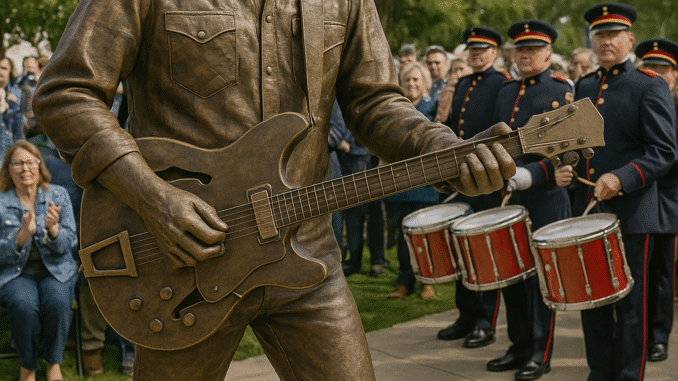
John Fogerty Honored with Statue in Hometown for Legendary Music Legacy
BERKELEY, CALIFORNIA – In a touching tribute to one of rock and roll’s most enduring voices, a statue of John Cameron Fogerty, founder and frontman of the iconic band Creedence Clearwater Revival (CCR), was unveiled yesterday in his hometown of Berkeley, California. The ceremony drew fans, musicians, and city officials, all eager to pay homage to the man whose raw vocals and swampy guitar riffs helped shape the sound of American rock in the late 1960s and early 1970s.
The life-size bronze statue stands at the entrance of Martin Luther King Jr. Civic Center Park, just a few blocks from where Fogerty grew up. Captured mid-strum with his signature Rickenbacker guitar and clad in his classic flannel shirt and jeans, the statue embodies the grit and authenticity that defined Fogerty’s style and career.
Mayor Sophie Hahn opened the unveiling ceremony with a heartfelt speech. “John Fogerty is not just a son of Berkeley—he’s a son of America. His songs told stories of working-class struggle, war, and heartache, yet always with resilience and fire. This statue isn’t just a tribute to his legacy—it’s a symbol of the power of music to move, unite, and inspire.”
Fogerty, now 80, was present at the event with his wife, Julie, and several of his children and grandchildren. Taking the stage after the cloth was lifted from the statue, Fogerty appeared visibly moved by the occasion.
“Berkeley was the place where I learned to dream big,” he said. “It’s where I got my first guitar, where I wrote some of the songs that changed my life. I never thought I’d be immortalized like this—especially not in bronze. I just wanted to make music that told the truth.”
Born on May 28, 1945, Fogerty formed Creedence Clearwater Revival with his brother Tom and two high school friends in the early 1960s. Though the band was short-lived, disbanding in 1972, its impact was profound. CCR delivered hit after hit—“Proud Mary,” “Bad Moon Rising,” “Fortunate Son,” and “Have You Ever Seen the Rain?”—blending Southern rock, blues, and folk into a sound that was unmistakably their own.
What made CCR—and Fogerty in particular—stand out was their lyrical focus on American life at a time of upheaval. While many of their contemporaries veered into psychedelic experimentation, Fogerty kept the songs grounded, turning the band into the voice of an era defined by the Vietnam War, civil rights movements, and growing class divisions.
His solo career in the decades since has been marked by both high-profile successes and personal battles, including legal disputes over song rights and decades of estrangement from the music industry. Yet Fogerty’s resilience mirrored that of the people he wrote for—he eventually reclaimed the rights to his music, returned to touring, and found a new generation of fans eager to embrace the timeless quality of his work.
The statue project was spearheaded by the Berkeley Arts Council and funded through a combination of city funds, private donations, and contributions from fellow musicians who cited Fogerty as a major influence. Bruce Springsteen, Bob Seger, and Tom Petty’s estate were among the contributors.
“I don’t know a single working musician who didn’t cut their teeth on ‘Born on the Bayou’ or ‘Down on the Corner,’” said Springsteen in a video message played during the event. “John taught us that you could write songs about real people, in real places, and still make them sing like an anthem.”
Throughout the day, fans gathered around the statue to take photos and share stories of how Fogerty’s music impacted their lives. A tribute concert followed in the evening, featuring local bands and surprise performances from special guests, including Fogerty himself, who closed the night with an emotional rendition of “Who’ll Stop the Rain.”
Berkeley officials announced that the site around the statue would be designated “Fogerty Square” and host an annual music festival celebrating roots rock and Americana.
As the sun set behind the statue and the crowd dispersed, one message rang clear: John Fogerty is more than a rock legend—he’s a cultural icon whose voice and vision have stood the test of time. And now, cast in bronze, he’ll stand watch over his hometown forever.
Leave a Reply